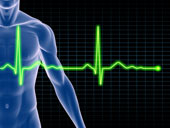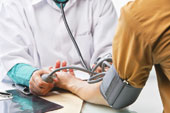
Rather than smoking or BMI, researchers have found that physical inactivity after 30 is the greatest risk factor for heart disease in women....


Rather than smoking or BMI, researchers have found that physical inactivity after 30 is the greatest risk factor for heart disease in women....

New cancer therapies, particularly agents that block vascular endothelial growth factor (VEGF) signaling, have improved the outlook for patients with some cancers and are now used as a first line......

According to a new study by the University of Colorado Boulder, an antioxidant that targets specific cell structures - mitochondria - may be able to reverse some of the negative effects of aging on......

Parents, forget the comfort food! It's time to send your college students care packages of fruit, veggies and exercise gear instead....

Despite fears over cost, the wide-scale screening of young people to detect risk of sudden cardiac death is feasible and cost effective, according to a study. More than 12,000 people aged between 14 and 35 were screened at a cost of £35 each; rates of subsequent referral for further investigation were low and considered of 'a relative low additional cost' to health services. ...

Researchers have found that a commonly prescribed drug restores blood flow to oxygen-starved muscles of boys with Duchenne muscular dystrophy, a genetic muscle-wasting disease that rarely is seen in girls but affects one in 3,500 male babies, profoundly shortening life expectancy. It is the most common fatal disease that affects children. ...

The entire heart muscle in young children may be capable of regeneration. In young mice 15 days old, cardiac muscle cells undergo a precisely timed spurt of cell division lasting around a day. This previously unobserved phenomenon contradicts the long-held idea that cardiac muscle cells do not divide after the first few days of life. ...

By simply carrying around their cellphones, patients who suffer from chronic disease could soon have an accurate health monitor that warns their doctors when their symptoms worsen. Unlike apps that merely count steps, this app uses eight motion parameters to perform a detailed analysis of a person's gait, or walking pattern, which can tell physicians much about the patient's cardiopulmonary, muscular...

From the age of 30 onwards, physical inactivity exerts a greater impact on a woman's lifetime risk of developing heart disease than the other well-known risk factors, suggests research. This includes overweight, the finding show, prompting the researchers to suggest that greater effort needs to be made to promote exercise. ...

Eating more fruits and vegetables may reduce the risk of stroke worldwide, according to a new analysis of 20 studies conducted in Europe, the United States and Asia. The American Heart Association advises the average adult to eat four to five servings each of fruits and vegetables daily, based on a 2,000-calorie diet. A diet rich in a variety of colors and types of vegetables and fruits is a way of...

A commonly performed test during certain types of heart surgery is not helpful and possibly harmful. The testing procedure, known as defibrillator testing (DT), is commonly used on people who require implantable cardioverter-defibrillators (ICDs) to prevent sudden cardiac death. It involves putting the patient into cardiac arrest to determine if the defibrillator can first recognize, then successfully...

Patients whose own red blood cells are recycled and given back to them during heart surgery have healthier blood cells better able to carry oxygen where it is most needed compared to those who get transfusions of blood stored in a blood bank, according to results of a small study. To recycle the blood, a machine known as a cell saver is used to collect what a patient loses during surgery, rinse away...

Despite fears over cost, the wide-scale screening of young people to detect risk of sudden cardiac death (SCD) is feasible and cost effective, according to a study presented at EuroPRevent 2014....

Women face greater limits on their lifestyle and have more severe symptoms as a result of peripheral artery disease (PAD), but minimally invasive procedures used to unclog arteries are just as......

Maintaining or boosting your physical activity after age 65 can improve your heart's electrical well-being and lower your risk of heart attack, according to a study in the American Heart Association......

Why phosphate rich foods can increase blood pressure and promote vascular calcifications has been discovered by scientists at the Vetmeduni Vienna....
Recent articles in the scientific literature and mass media that question the use of testosterone (T) therapy to treat T deficiency, or "low T," and assert the cardiovascular risks of T therapy, are......
Moms and dads of babies born with what's known as a "hole" in their heart usually brace themselves for open-heart surgery, the accepted route to fixing the life-threatening defect....
Two new studies presented at the World Heart Federation's World Congress of Cardiology (WCC) today show the importance of collecting comprehensive patient information nationally and providing......
A new study in Nature challenges research data that form the scientific basis of clinical trials in which heart attack patients are injected with stem cells to try and regenerate damaged heart tissue. Researchers at Cincinnati Children’s Hospital Medical Center and the Howard Hughes Medical Institute (HHMI), report May 7 that cardiac stem cells used in ongoing clinical trials - which express a protein...